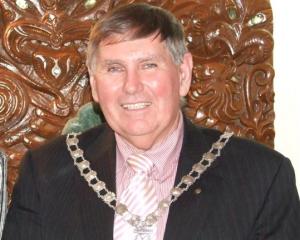
Wholesale electricity prices had been low for several years, lulling retailers into a "false sense of security", Contact Energy chief executive Dennis Barnes said yesterday.
Higher tariffs would be needed to build additional generation facilities necessary to meet increasing demand for electricity, he said.
His comments were a "clear warning" Contact would increase its prices soon, and an invitation to other retailers to do the same, Wellington-based energy analyst Molly Melhuish said.
Mrs Melhuish, co-convener of the Domestic Energy Users' Network, said price increases would hit households the hardest. While households could switch companies to save money, unlike large users such as businesses they were unable to bargain electricity charges down by buying in bulk on the wholesale market.
"Householders will be literally left out in the cold [in bargaining]. And householders in colder climates like Dunedin will suffer more".
Retail electricity is sold per kilowatt hour (kWh) and prices fluctuate depending on many factors including wholesale prices and the time of the year. Average May retail prices per kilowatt hour had risen by 77.6% since 2002, Mrs Melhuish said. While some of the increase was attributable to inflation, the annual increase had been 2%-3% above inflation.
Most householders already thought their power bills were too high, she said.
But she predicted increases over the next decade would be even higher because of factors such as emissions trading scheme requirements, the need for additional generation facilities, scarcity pricing, a planned upgrade of the Cook Strait cable, and the need for companies to maximise profits for shareholders.
Moves to partially privatise state-owned power companies would also have an impact.
At present, state-owned companies were required to exercise "self-restraint" with their pricing which she estimated saved consumers 2c-4c per kWh.
"With privatisation, self-restraint will be legally gone."
Increasing electricity prices would put even more pressure on families, beneficiaries and low income workers, Dunedin social agency representatives said.
Hundreds of Dunedin people were already approaching agencies seeking help with their electricity bills, Dunedin Budget Advisory Service and Anglican Family Care spokeswomen said.
Budget advice executive officer Shirley Woodrow said the highest household electricity account she had ever seen was $7000 for new charges and arrears and the service had recently helped a client $2500 in arrears.
It was not uncommon for Anglican Family Care to see people with monthly electricity bills of $400-$500 and people owing $1000 including arrears, child and family support services manager Kathy Richards said.
Mrs Woodrow said there would be differing reactions to electricity price rises. In general, older people were more afraid to turn on heaters because they did not want large bills, while younger people were more likely to "turn the heaters on, get a large bill and then wonder how they are going to pay it."
Price rises would be too much for some clients, Mrs Richards said.
Anglican Family Care administers the Dunedin Electricity Consumers' Fund, a $200,000 pool funded by the Dunedin City Council which pays out grants of $200 to $350 to help people meet their electricity bills. About 800 people receive help each year.
While agencies were "very grateful" for the fund, Mrs Richards said there were always more applicants than money available so people were limited to one grant every five years except in dire circumstances.
Increasing electricity prices would likely increase the number of applications, she said.
"Things are only going to get tougher. The financial outlook is gloomy for many people."



